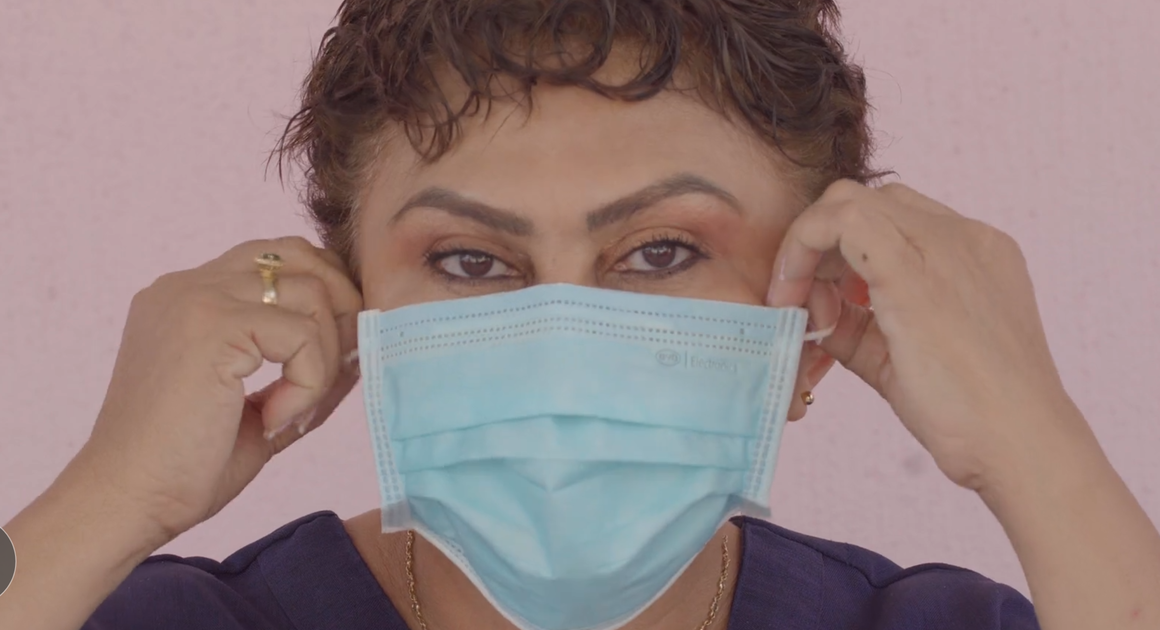-
Tags (18)
- Brazil
- Pakistan
- Tunisia
- Zimbabwe
- Health & Social Care Services
- Fédération Générale de la Santé
- Zimbabwe Nurses Association (ZINA)
- PSI
- Africa & Arab Countries
- Asia & Pacific
- Inter-America
- Trade Union Rights
- Southern Africa
- Arab Countries
- South Asia
- All Sindh Lady Health Workers and Employees Union
- Covid-19
- Support Brazilian health workers in their struggle for indemnity and salary floor
Behind The Mask Survey reveals how Bolsonaro's denialism contributed to deaths of 4500 health workers in Brazil
 Nurse Graciete Mouzinho, from Manaus, is the main character in the Brazilian episode of the interactive documentary "Behind the Mask"
Nurse Graciete Mouzinho, from Manaus, is the main character in the Brazilian episode of the interactive documentary "Behind the Mask"Eight out of ten Brazilian healthworkers who died saving lives through Covid were women, and almost half of them were people of colour; two-thirds of those who died had no formal employment contracts.

Marcelo Netto
An unprecedented survey reveals how more than 4,500 public and private health professionals died in Brazil in the first wave of the pandemic, between March 2020 and December 2021. In the same period the Brazilian government denied the extent of the disease and delayed the delivery of vital resources. A large proportion of these workers were not provided with basic protective equipment and most did not have formal work contracts. Eight out of ten of those who died saving lives in the pandemic were women.
The research, launched today in Brazil by PSI was made by the data intelligence studio Lagom Data and follows the launch in the country of the interactive documentary "Behind The Mask", which denounces the situation across four countries through Covid-19. Zimbabwe, Pakistan and Tunisia were the other countries chosen.
In the episode that takes place in Brazil, the second of the series, nurse Graciete Mouzinho, from Manaus, is the central character. Graciete, in the midst of the chaos of the pandemic, collects testimonials from workers to build a legal case against the Bolsonaro government.
Video
Eight out of ten among those who died of Covid-19 saving lives were women, and almost half of them, 47%, were black and brown; two-thirds of those who died had no formal employment contracts.
Survey reveals how Bolsonaro's denialism helped kill 4,500 health workers in Brazil
"There was a lack of protective equipment, oxygen, vaccines, medicines and there were false and insulting messages from president Bolsonaro about Covid-19, shocking the world. even today, frontline professionals continue to be undervalued in Brazil," says Rosa Pavanelli, PSI General Secretary.
Until now, frontline workers and their unions hadn't been able to grasp just how deadly these policies had been. The data, compiled by journalist Marcelo Soares, from Lagom Data, based on micro-data from the Brazilian government, reveals that deaths increased more rapidly than observed in the general population, especially in the months in which personal protective equipment (PPE) was lacking, and that the impact of the disease was greater in occupations with lower wages and closer to the front line: nursing auxiliaries and technicians (70%) had higher rates of death than nurses (25%), and significantly more than doctors (5%).
Eight out of ten health professionals who died were women; 47% of them were black and brown
The 1,184 nurses killed directly impacted the care of 21,300 patients. By the ratios of Cofen (Federal Council of Nursing), each nurse is responsible for up to 18 patients and each attendant, 9 patients. Yet in Manaus, for example, each nurse attended 40 patients with the help of two attendants.
Furthermore, the study reveals that eight out of ten of those who died saving lives were women, and almost half, 47%, were black and brown women, who are normally more represented in less well remunerated activities. Two-thirds of these professionals most likely did not have a formal employment contract, according to a cross-reference between data from the Ministry of Health and information on healthworker deaths in the new CAGED data (General Cadastre for Employed and Unemployed).
Priority vaccination
According to the research, in the first months of the pandemic, the curve of excess deaths among health professionals was higher than that of all occupations in Brazil. That is, health professionals died proportionally more. In May 2020, the excess deaths reached twice the previous average.
By March 2021, with a confluence of factors ranging from pressure for an early return to face-to-face activities, lack of equipment, to the government's slowness with vaccination, Covid deaths exploded across Brazil. Health workers felt this impact too, but for less time.
With priority vaccination of health workers, mortality among them dropped dramatically - three months before the rest of the professions. Which proves that countless workers' lives could have been saved were it not for the denialism of the Bolsonaro government.
Devaluation - wage floor and compensation
Despite being called "heroes" at the peak of the pandemic, frontline professionals are still undervalued in Brazil. The applause did not come accompanied by better wages and working conditions.
Instead, we witnessed the impasse in the application of the nursing salary floor law, which was being push for for years prior to Covid and which, despite the pandemic, continues to meet resistance. According to the law approved by the national Congress, but yet to be implemented, the salary of a nurse today should be R$ 4.750,00, a technician R$ 3.325,00, and nursing assistants and midwives R$ 2.375,00.
The same can be said of the Bolsonaro government's attempt to bar a law approved in Congress (Law 14.128/2021) that provides compensation to health professionals permanently disabled because they acquired Covid-19 due to the nature of their work or to their dependents in case of death by Covid-19. Fortunately, the collegiate of the STF (Federal Supreme Court) recently unanimously found that these measures must be impllemented.
